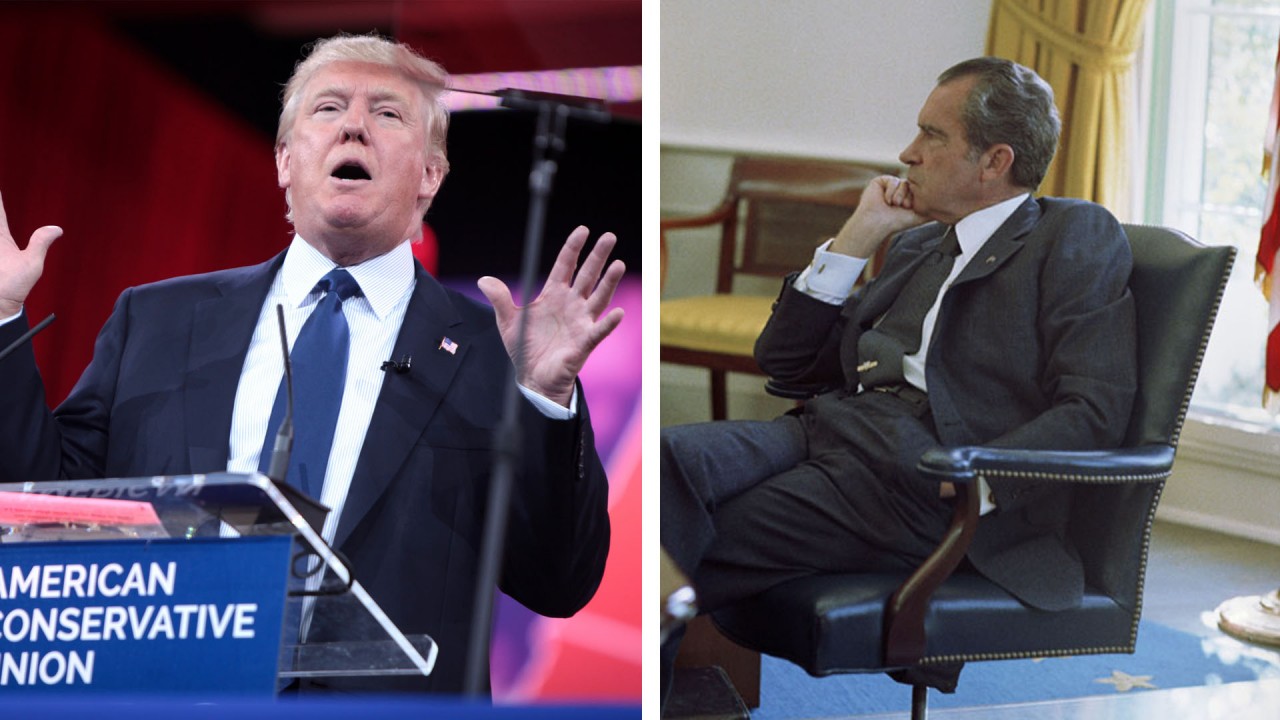
“You have to face the fact that the whole problem is really the blacks,” Nixon once explained to his chief of staff, H.R. Haldeman. “The key is to devise a system that recognizes that while not appearing to.” Left: Donald Trump (Gage Skidmore/Flickr cc 2.0). Right: Richard Nixon in the Oval Office, May 13, 1974. (Richard Nixon Library)
This post originally appeared at The Nation.
Three years ago, as the Republican-led House of Representatives engineered a brief government shutdown, Congressman Marlin Stutzman (R-IN) explained the strategy underpinning the protest. “We have to get something out of this,” he said. “And I don’t know what that even is.” The shutdown wasn’t a tactic so much as a tantrum, an act of collective petulance posing as politics — inexplicable to the outside world, incoherent in its aims and incandescent in its rage.
The bizarre circus that the GOP presidential primary has become is not a freak occurrence. Regardless of the eventual nominee, the rise of Donald Trump (“I would bomb the shit out of [ISIS]”), the ascent of Ted Cruz (“To God be the glory”) and the endurance of Ben Carson (“Putin is a one-horse country: oil and energy”) do not contradict the general trajectory of the party, but rather confirm it. This fact-free, bigoted populism awash in money and drowning in misanthropy may illustrate the GOP at its most brazen, but it’s hardly in any way aberrant.
In this regard, Trump is the party’s most obvious emissary. His blatant xenophobia emerges from the GOP’s half-century of race-baiting since Richard Nixon’s Southern strategy was first conceived. The initial idea was to woo Southern whites, who were angry about the advances of the civil-rights movement, with coded racial messaging that wouldn’t alienate the party’s Northern supporters. “You have to face the fact that the whole problem is really the blacks,” Nixon once explained to his chief of staff, H.R. Haldeman. “The key is to devise a system that recognizes that while not appearing to.” This method was once very effective. Ronald Reagan launched his 1980 campaign at the Neshoba County Fair in Mississippi, not far from where three civil-rights activists had been murdered in 1964, by talking about states’ rights. George H.W. Bush had his infamous Willie Horton ad in 1988, while Bush Jr. spoke at Bob Jones University in 2000, where interracial dating was banned at the time.
But with white people heading toward minority status and becoming a lower percentage of the voting public every cycle, the message necessarily gets cruder — particularly with the presence of a black president. In the 2012 GOP primaries, former Pennsylvania senator Rick Santorum told a crowd in Iowa that “I don’t want to make black people’s lives better by giving them somebody else’s money,” while Newt Gingrich branded Obama the “food-stamp president.”
So by the time Trump came on the scene, the party had done away with the dog whistle in favor of a police whistle — no codes necessary. The Mexicans are sending us “rapists”; the Chinese are “cheating”; America needs “a total and complete shutdown” on Muslims coming into the country.
Elements of the Republican establishment bristled, of course. Back in 2012, Senator Lindsey Graham was already warning that when it came to “the demographics race,” the GOP was “losing badly. We’re not generating enough angry white guys to stay in business for the long term.”
But that was the business they were in: For a generation, the party had galvanized its base on precisely this kind of message, only more artfully put and more plausibly denied. So when Trump rails against political correctness — which always goes down well on the stump — he’s really just calling for a return to unbridled hate speech. No wonder he comes first in a crowded pack for those Republican voters who want a candidate who “tells it like it is.”
Trump’s rallies are also unburdened by either actual policies or tangible facts. He just says stuff — whatever comes into his head, it seems — and people cheer or laugh, but rarely call him on it. Whether it’s true or consistent really doesn’t matter. The fact that Trump was previously pro-choice and pro-single-payer, or that he’s donated money to Hillary Clinton’s senatorial campaigns and had the Clintons at his wedding, is shrugged off. Nobody cares that there’s a net flow of Mexicans leaving America: “We’re gonna build a big wall,” Trump says. “It’s gonna be a beautiful wall. It’s gonna be a great big beautiful wall.” His healthcare policy? He’s going to replace Obamacare with something “super-terrific.”
Any mystery as to why this is working vanishes once one realizes that he’s talking to the Republican base, 43 percent of whom still believe that Obama is a Muslim — roughly the same percentage who believe that he was born in America. This is the same party that swift-boated John Kerry and insisted that the Clintons were bumping people off and running drugs into Arkansas. They really don’t care about the facts.
Nor did Trump invent this trend. In 2011, GOP primary contender Herman Cain proudly announced that he did not know the name of the president of “Ubeki-beki-beki-beki-stan-stan.” More than one in four Republicans in Mississippi, and one in five in Alabama, believed that interracial marriage should be illegal, while closer to two-thirds in both states didn’t believe in evolution. Trump is just the most ostentatious and successful manifestation of this trend, and the Republican hierarchy is stumped on what to do about it.
In 2008, Senator John McCain, the GOP nominee, memorably took the mic from campaign volunteer Gayle Quinnell, who said she couldn’t trust Obama because “he’s an Arab.” “No, ma’am,” McCain said. “He’s a decent family man, [a] citizen that I just happen to have disagreements with on fundamental issues.” Yet without millions of people like Quinnell, McCain would have suffered not just a defeat but a rout. Now the GOP’s leaders have ceded the mic once again, and they’re struggling to seize it back.
Of course, the Republican establishment never openly embraced such statements. Nonetheless, it was this mixture of racially charged messaging and a tacit acceptance of falsehoods that underpinned the Tea Party’s rise. This is the wave of sewage that the GOP surfed all the way to majorities in both houses of Congress. Now they’re up to their necks in it.




